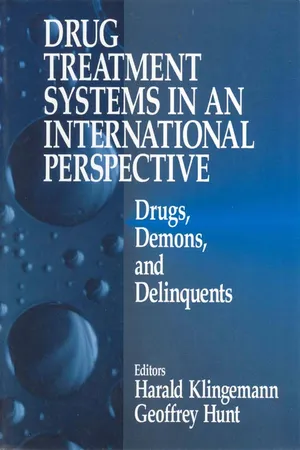
eBook - PDF
Drug Treatment Systems in an International Perspective
Drugs, Demons, and Delinquents
This is a test
- 360 pages
- English
- PDF
- Available on iOS & Android
eBook - PDF
Drug Treatment Systems in an International Perspective
Drugs, Demons, and Delinquents
Book details
Table of contents
Citations
About This Book
In the last 10 years, many countries have seen a rapid expansion in their specific drug treatment services. This book describes the ways in which 20 different countries worldwide have chosen to cope with the spread of illicit drugs and the expansion of services. Contributors from a range of disciplines including sociology, psychology, anthropology, political science, psychoanalysis and criminology present results which provide access to information on drug treatment in these countries, and investigate the cultural and societal context in which drug treatment developed. The book also compares each of the 20 countries on the themes of: women and treatment; financing treatment; and the relationship between alcohol and drug treatment.
Frequently asked questions
At the moment all of our mobile-responsive ePub books are available to download via the app. Most of our PDFs are also available to download and we're working on making the final remaining ones downloadable now. Learn more here.
Both plans give you full access to the library and all of Perlego’s features. The only differences are the price and subscription period: With the annual plan you’ll save around 30% compared to 12 months on the monthly plan.
We are an online textbook subscription service, where you can get access to an entire online library for less than the price of a single book per month. With over 1 million books across 1000+ topics, we’ve got you covered! Learn more here.
Look out for the read-aloud symbol on your next book to see if you can listen to it. The read-aloud tool reads text aloud for you, highlighting the text as it is being read. You can pause it, speed it up and slow it down. Learn more here.
Yes, you can access Drug Treatment Systems in an International Perspective by Harald Klingemann, Geoffrey Hunt in PDF and/or ePUB format, as well as other popular books in Psychology & Addiction in Psychology. We have over one million books available in our catalogue for you to explore.
Information
Table of contents
- Cover
- Contents
- Acknowledgments
- Introduction
- Part I - Drug Prohibition and the Abstinence Paradigm
- Chapter 1 - The Drug Treatment System in the United States: A Panacea for the Drug War?
- Chapter 2 - The Treatment of Drug-Related Problems in Canada: Controlling, Caring, and Curing
- Chapter 3 - Expansion and Implosion: The Story of Drug Treatment in Sweden
- Chapter 4 - Finland: Drug Treatment at the Margins
- Chapter 5 - Comment on Part 1: Thunder and Silence in Drug Treatment: Four Nations in Moral Concert
- Part II - The Experimental Countries
- Chapter 6 - The English Drug Treatment System: Experimentation or Pragmatism?
- Chapter 7 - Integrating Care, Cure, and Control: The Drug Treatment System in the Netherlands
- Chapter 8 - Harm Reduction and Abstinence: Swiss Drug Policy at a Time of Transition
- Chapter 9 - Comment on Part 2: Tailoring Drug Treatment to Changing Times
- Part III - Social Change and Drug Treatment in Central Europe and Russia
- Chapter 10 - The Drug Treatment System in Russia: Past and Present, Problems and Prospects
- Chapter 11 - Therapeutic Communities as a Major Response to Drug Abuse in Poland
- Chapter 12 - Drug Users as Scapegoats in Hungary?
- Chapter 13 - Comment on Part 3: From Ideology to Social Reality: Drug Use in Postcommunist Society
- Part IV - From Moral Crusades to Cost-Efficient Pragmatism
- Chapter 14 - Illicit Drugs in Germany and the Emergence of the Modern Drug Treatment System
- Chapter 15 - The Development of Drug Treatment in the Shadow of the Narcotic Law: The Case of Austria
- Chapter 16 - Comment on Part 4: German Rechthaberei and its Contribution to a Modern Drug Abuse Treatment System
- Part V - The Latin American Connection
- Chapter 17 - Drug Consumption and Drug Treatment in a Drug-Producing Country: Colombia between Myth and Reality — A View from the Inside
- Chapter 18 - Who is to Blame? The Discovery of Domestic Drug Problems and the Quest for Recognition of Therapeutic Communities in Peru
- Chapter 19 - Comment on Part 5: Drug Policies and Tradition: Implications for the Care of Addictive Disorders in Two Andean Countries
- Part VI - Wine and Illicit Drugs
- Chapter 20 - A System at Its Starting Blocks: Drug Treatment in France
- Chapter 21 - The Spread of AIDS and Drug Treatment in Spain
- Chapter 22 - Building a Drug Treatment System in Postrevolutionary Portugal
- Chapter 23 - Legal Changes, Political Pressure, and Drug Treatment in Italy: From a Hard-Line Approach to Decriminalization
- Chapter 24 - Comment on Part 6: Dionysus is Back
- Part VII - Economic Revolution and Cultural Transformation in the Far East
- Chapter 25 - Societal Control and the Model of Legal Drug Treatment: A Japanese Success Story?
- Chapter 26 - Drug Treatment and Public Security in the People's Republic of China
- Chapter 27 - Comment on Part 7: From the Opium Wars to Strict Drug Policies in East Asia
- Part VIII - Gender, Finance, and System Integration: Findings from 20 Countries
- Chapter 28 - Equal Access with Optimum Costs: Issues of Financing and Managing Drug Treatment
- Chapter 29 - Gender and Drug Treatment Systems
- Chapter 30 - The Relationship between Alcohol and Drug Treatment Systems
- Appendix: Summary Table
- Glossary
- Index
- About the Editors
- About the Contributors